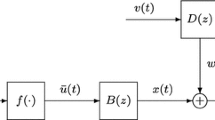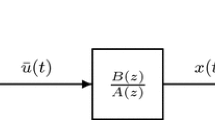Abstract
This paper focuses on the identification problem of Hammerstein systems with dual-rate sampling. Using the key-term separation principle, we derive a regression identification model with different input updating and output sampling rates. To solve the identification problem of the dual-rate Hammerstein systems with the unmeasurable variables in the information vector, an auxiliary model-based recursive least squares algorithm is presented by replacing the unmeasurable variables with their corresponding recursive estimates. Convergence properties of the algorithm are analyzed. Simulation results show that the proposed algorithm can estimate the parameters of a class of nonlinear systems.




Similar content being viewed by others
References
Ding, F.: System Identification—New Theory and Methods. Science Press, Beijing (2013)
Ding, F.: System Identification—Performances Analysis for Identification Methods. Science Press, Beijing (2014)
Liu, Y.J., Xiao, Y.S., Zhao, X.L.: Multi-innovation stochastic gradient algorithm for multiple-input single-output systems using the auxiliary model. Appl. Math. Comput. 215(4), 1477–1483 (2009)
Liu, Y.J., Sheng, J., Ding, R.F.: Convergence of stochastic gradient estimation algorithm for multivariable ARX-like systems. Comput. Math. Appl. 59(8), 2615–2627 (2010)
Liu, X.G., Lu, J.: Least squares based iterative identification for a class of multirate systems. Automatica 46(3), 549–554 (2010)
Liu, Y.J., Xie, L., et al.: An auxiliary model based recursive least squares parameter estimation algorithm for non-uniformly sampled multirate systems. Proc. Inst. Mech. Eng. 223(4), 445–454 (2009)
Ding, F., Qiu, L., Chen, T.: Reconstruction of continuous-time systems from their non-uniformly sampled discrete-time systems. Automatica 45(2), 324–332 (2009)
Ding, J., Shi, Y., et al.: A modified stochastic gradient based parameter estimation algorithm for dual-rate sampled-data systems. Digit. Signal Process. 20(4), 1238–1249 (2010)
Ding, F., Liu, X.P., Yang, H.Z.: Parameter identification and intersample output estimation for dual-rate systems. IEEE Trans. Syst. Man Cybern. A 38(4), 966–975 (2008)
Ding, F., Chen, T.: Hierarchical identification of lifted state-space models for general dual-rate systems. IEEE Trans. Circuits Syst. I 52(6), 1179–1187 (2005)
Ding, J., Ding, F., et al.: Hierarchical least squares identification for linear SISO systems with dual-rate sampled-data. IEEE Trans. Autom. Control 56(11), 2677–2683 (2011)
Liu, Y.J., Ding, F., Shi, Y.: Least squares estimation for a class of non-uniformly sampled systems based on the hierarchical identification principle. Circuits Syst. Signal Process. 31(6), 1985–2000 (2012)
Ding, F., Chen, T.: Hierarchical gradient-based identification of multivariable discrete-time systems. Automatica 41(2), 315–325 (2005)
Ding, F., Chen, T.: Hierarchical least squares identification methods for multivariable systems. IEEE Trans. Autom. Control 50(3), 397–402 (2005)
Chen, J., Zhang, Y., et al.: Gradient-based parameter estimation for input nonlinear systems with ARMA noises based on the auxiliary model. Nonlinear Dyn. 72(4), 865–871 (2013)
Hu, P.P., Ding, F.: Multistage least squares based iterative estimation for feedback nonlinear systems with moving average noises using the hierarchical identification principle. Nonlinear Dyn. 73(1–2), 583–592 (2013)
Ding, F., Ma, J.X., Xiao, Y.S.: Newton iterative identification for a class of output nonlinear systems with moving average noises. Nonlinear Dyn. 74(1–2), 21–30 (2013)
Deng, K.P., Ding, F.: Newton iterative identification method for an input nonlinear finite impulse response system with moving average noise using the key variables separation technique. Nonlinear Dyn. (2014). doi:10.1007/s11071-013-1202-3
Shen, Q.Y., Ding, F.: Iterative estimation methods for Hammerstein controlled autoregressive moving average systems based on the key-term separation principle. Nonlinear Dyn. (2014). doi:10.1007/s11071-013-1097-z
Wang, D.Q., Ding, F., Chu, Y.Y.: Data filtering based recursive least squares algorithm for Hammerstein systems using the key-term separation principle. Inf. Sci. 222, 203–212 (2013)
Ding, F., Shi, Y., Chen, T.: Auxiliary model-based least-squares identification methods for Hammerstein output-error systems. Syst. Control Lett. 56(5), 373–380 (2007)
Wang, D.Q., Ding, F., Liu, X.M.: Least squares algorithm for an input nonlinear system with a dynamic subspace state space model. Nonlinear Dyn. 75(1-2), 49–61 (2014)
Ding, F., Shi, Y., Chen, T.: Gradient-based identification methods for Hammerstein nonlinear ARMAX models. Nonlinear Dyn. 45(1–2), 31–43 (2006)
Xiao, Y.S., Yue, N.: Parameter estimation for nonlinear dynamical adjustment models. Math. Comput. Model. 54(5–6), 1561–1568 (2011)
Li, J.H., Ding, F., Yang, G.W.: Maximum likelihood least squares identification method for input nonlinear finite impulse response moving average systems. Math. Comput. Model. 55(3–4), 442–450 (2012)
Ding, F., Duan, H.H.: Two-stage parameter estimation algorithms for Box–Jenkins systems. IET Signal Process. 7(8), 646–654 (2013)
Shi, Y., Fang, H.: Kalman filter based identification for systems with randomly missing measurements in a network environment. Int. J. Control 83(3), 538–551 (2010)
Li, H., Shi, Y.: Robust H-infinity filtering for nonlinear stochastic systems with uncertainties and random delays modeled by Markov chains. Automatica 48(1), 159–166 (2012)
Ding, F.: Combined state and least squares parameter estimation algorithms for dynamic systems. Appl. Math. Model. 38(1), 403–412 (2014)
Ding, J., Ding, F.: Bias compensation based parameter estimation for output error moving average systems. Int. J. Adapt. Control Signal Process. 25(12), 1100–1111 (2011)
Ding, F.: Coupled-least-squares identification for multivariable systems. IET Control Theory Appl. 7(1), 68–79 (2013)
Ding, F.: Hierarchical multi-innovation stochastic gradient algorithm for Hammerstein nonlinear system modeling. Appl. Math. Model. 37(4), 1694–1704 (2013)
Xiao, Y.S., Ding, F., et al.: On consistency of recursive least squares identification algorithms for controlled auto-regression models. Appl. Math. Model. 32(11), 2207–2215 (2008)
Wang, D.Q.: Least squares-based recursive and iterative estimation for output error moving average systems using data filtering. IET Control Theory Appl. 5(14), 1648–1657 (2011)
Ding, F., Liu, X.P., Liu, G.: Identification methods for Hammerstein nonlinear systems. Digit. Signal Process. 21(2), 215–238 (2011)
Zhou, L.C., Li, X.L., Pan, F.: Gradient based iterative parameter identification for Wiener nonlinear systems. Appl. Math. Model. 37(16–17), 8203–8209 (2013)
Vörös, J.: Parametric identification of systems with general backlash. Informatica 23(2), 283–298 (2012)
Ding, F., Ding, J.: Least squares parameter estimation with irregularly missing data. Int. J. Adapt. Control Signal Process. 24(7), 540–553 (2010)
Zhou, L.C., Li, X.L., Pan, F.: Gradient-based iterative identification for MISO Wiener nonlinear systems: application to a glutamate fermentation process. Appl. Math. Lett. 26(8), 886–892 (2013)
Li, X.L., Ding, R.F., Zhou, L.C.: Least-squares-based iterative identification algorithm for Hammerstein nonlinear systems with non-uniform sampling. Int. J. Comput. Math. 90(7), 1524–1534 (2013)
Ding, F., Chen, T.: Combined parameter and output estimation of dual-rate systems using an auxiliary model. Automatica 40(10), 1739–1748 (2004)
Ding, F., Chen, T.: Parameter estimation of dual-rate stochastic systems by using an output error method. IEEE Trans. Autom. Control 50(9), 1436–1441 (2005)
Ding, F., Liu, X.M., et al.: Hierarchical gradient based and hierarchical least squares based iterative parameter identification for CARARMA systems. Signal Process. 97, 31–39 (2014)
Ding, F.: Decomposition based fast least squares algorithm for output error systems. Signal Process. 93(5), 1235–1242 (2013)
Ding, F.: Two-stage least squares based iterative estimation algorithm for CARARMA system modeling. Appl. Math. Model. 37(7), 4798–4808 (2013)
Ding, F., Liu, X.G., Chu, J.: Gradient-based and least-squares-based iterative algorithms for Hammerstein systems using the hierarchical identification principle. IET Control Theory Appl. 7(2), 176–184 (2013)
Wang, D.Q., Ding, F.: Least squares based and gradient based iterative identification for Wiener nonlinear systems. Signal Process. 91(5), 1182–1189 (2011)
Wang, D.Q., Ding, F.: Hierarchical least squares estimation algorithm for Hammerstein–Wiener systems. IEEE Signal Process. Lett. 19(12), 825–828 (2012)
Liu, Y.J., Ding, F., Shi, Y.: An efficient hierarchical identification method for general dual-rate sampled-data systems. Automatica 50 (2014). doi:10.1016/j.automatica.2013.12.025
Zhu, D.Q., Kong, M.: Adaptive fault-tolerant control of nonlinear system: an improved CMAC based fault learning approach. Int. J. Control. 80(10), 1576–1594 (2007)
Zhu, D.Q., Gu, W.: Sensor fusion for integrated circuit fault diagnosis using a belief function model. Int. J. Distrib. Sens. Netw. 6(4), 247–261 (2008)
Zhu, D.Q., Liu, Q., Yang, Y.S.: An active fault-tolerant control method of unmanned underwater vehicles with continuous and uncertain faults. Int. J. Adv. Robot. Syst. 5(4), 411–418 (2008)
Acknowledgments
This work was supported by the National Natural Science Foundation of China, the Fundamental Research Funds for the Central Universities (JUDCF11042, JUDCF12031), the PAPD of Jiangsu Higher Education Institutions and the 111 Project (B12018)
Author information
Authors and Affiliations
Corresponding author
Rights and permissions
About this article
Cite this article
Li, X., Zhou, L., Sheng, J. et al. Recursive least squares parameter estimation algorithm for dual-rate sampled-data nonlinear systems. Nonlinear Dyn 76, 1327–1334 (2014). https://doi.org/10.1007/s11071-013-1212-1
Received:
Accepted:
Published:
Issue Date:
DOI: https://doi.org/10.1007/s11071-013-1212-1




